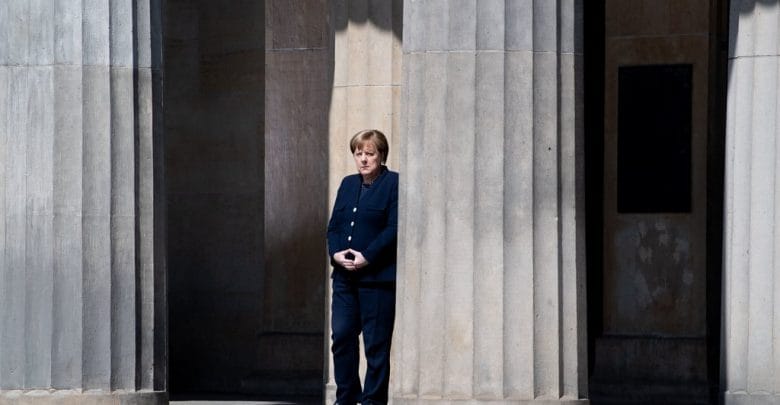
Germany’s Lessons for China and America
Better to love your country with a broken heart than love it blind.
“The nation-state alone does not have a future,” Angela Merkel, the German chancellor, said this week. It was a direct challenge to President Trump’s “America First,” the slogan whose poison keeps on giving. His United States has become the most unserious of nations.
Easy, you might say, for a German to dismiss the nation-state. German history, after 1945, became the quest to emerge from national shame. This month, on the 75th anniversary of the end of World War II in Europe, Frank-Walter Steinmeier, the German president, said:
“Germany’s past is a fractured past — with responsibility for the murdering of millions and the suffering of millions. That breaks our hearts to this day. And that is why I say that this country can only be loved with a broken heart.”
For an American, suffering the daily drivel of the Blather-Mouth in Chief, Steinmeier’s statement is powerful — in its honesty, its humility, its seriousness, its decency, its morality, its courage. The Trump administration consigned all those words to the American past.
I don’t think it’s easy, even for a German, to speak of brokenhearted love of country, nor to pronounce, as Merkel did, the demise of the “nation-state alone.” Nationalism is the most facile and effective of political tools, as well as the most dangerous. It was important, in the midst of a pandemic that has revealed a world incapable of a coordinated response and devoid of American leadership, that Europe’s most powerful nation step forward with honor.
The European Union, that entity with a stubborn heartbeat, has emerged better from the pandemic than China or the United States. The fear-driven Chinese cover-up of the coronavirus and the chaotic denialism of the Trump administration have been the two main contributors to the disaster. President Xi Jinping’s tightening despotism and the dilapidation of American democracy were evident.
It is not just the menaced citizens of Hong Kong who feel queasy about Xi’s China, and not just Americans who feel uneasy about the squalor of Trump. A fish rots from the head down. Both China and the United States traffic in lies.
In China, whistle-blowers die or disappear after speaking out on the country’s biological Chernobyl. In Trump’s United States, three inspectors general, including Steve Linick at the shameful Mike Pompeo’s State Department, are fired, and one deputy inspector general. A whistle-blower federal scientist, Rick Bright, is ousted. Oversight is the enemy of leaders who seek impunity in order to do their worst.
Xi grabs power for life and Trump envies him. The most terrifying thing the pandemic has revealed about the two great powers of the 21st century is the ways in which they resemble each other.
In an important forthcoming report for the Council on Foreign Relations, Robert Blackwill, a former United States ambassador to India, and Thomas Wright, the director of the Center on the United States and Europe at the Brookings Institution, speak of the “end of world order.” America’s “reputation as a dysfunctional power” and China’s growing “coercive power” contribute to that. The virus “exacerbates tensions.”
Merkel gave her judgment on the nation-state as Germany, for the first time, agreed to mutualize debt to help fund Europe’s weaker economies. She and Emmanuel Macron, the French president, announced an agreement on a recovery fund worth almost $550 billion to be financed by common borrowing. Merkel is a cautious leader capable of boldness inspired by principle. For Germany, whose perennial specters include the hyperinflation of the 1920s and whose perennial obsessions include fiscal discipline, this was a radical break and step toward a more federal Europe.
The German chancellor — who will not seek re-election next year, and who will be missed — signaled that innovation is needed. The world cannot return to where it was before the virus. The status quo ante is untenable. The nationalism of Trump’s America, Xi’s China and Vladimir Putin’s Russia is not the answer.
Stephen Heintz, the president of the Rockefeller Brothers Fund, has written of a crisis “that stems from the growing obsolescence of three core operating systems that have shaped civilization for the past 350 years: capitalism, fueled by carbon since the dawn of the Industrial Age and increasingly driven by global financialization; the nation-state system, formalized by the Treaty of Westphalia in 1648; and representative democracy, a system of self-rule based on Enlightenment ideals of freedom, fairness, justice and equality.”
The problem is that “our practice of capitalism is both putting the planetary ecosystem at risk and generating vast economic inequality.” The nation-state is “inadequate for managing transnational challenges like global warming.” And “representative democracy is neither truly representative nor very democratic as citizens feel that self-rule has given way to rule by corporations, special interests and the wealthy.”
The virus and accompanying economic collapse have only redoubled the urgency of these reflections. This is the Age of Undoing — of world order, of international law, of truth, of America’s word. It is a dangerous time, as Germany knows better than any nation. Autocracy feeds on fear, misery, resentment and lies. It did in the 1930s; it does now. Better to love your country with a broken heart than to love it blind.
